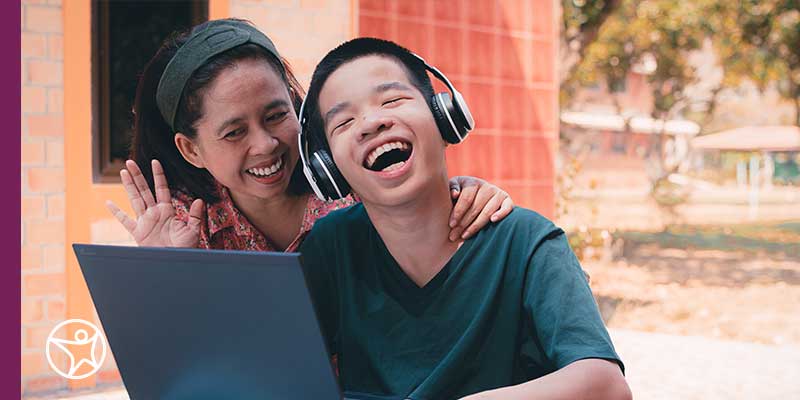How Online School Supports Students with Special Needs
byCharlotte Davies
6 min to read
Thanks to the Americans with Disabilities Act (ADA), businesses and other public venues are required to provide “reasonable accommodation” for people with disabilities. Parents of children who have disabilities and special needs have many K–12 online school choices. Virtual schools like Connections Academy provide a safe and inclusive environment where students with special needs can learn from the comfort of their own home and on a schedule that suits them.
“We have two children with multiple medical conditions that require round-the-clock care,” said a Michigan Connections Academy Learning Coach. “We have been thrilled to have a public school-accredited program that we could do from the safety of our home while caring for our children.”
How Does Online Schooling for Special Needs Students Work?
Accommodations for Students with Disabilities
The Individuals with Disabilities Education Act (IDEA Part B) was passed to provide federal funding to support services for children ages 3–21 who have disabilities. Through IDEA, states and public agencies provide early intervention, special education, and related services to more than 8 million children.
While federal law mandates that every child receive a free and appropriate education, often referred to as FAPE, in the least-restrictive environment possible, IDEA also requires schools to give students with special needs the necessary accommodations and/or modifications to support their learning.
Additionally, Section 504 of the Rehabilitation Act of 1973 is a federal law that offers protection to those individuals who have a disability. Under Section 504, an individual who has a physical or mental impairment that significantly limits a major life activity is considered someone with a disability. In schools, this means that a person with a disability eligible under Section 504 may receive reasonable accommodation and/or reasonable modifications to policies, practices, or procedures.
Virtual public schools must follow ADA and IDEA guidelines, just like their brick-and-mortar counterparts, which makes online schooling for children with special needs a viable option.

How Online Learning Helps Students with Special Needs
Some children can learn easily in a traditional brick-and-mortar classroom, while other students may require a different approach to learning. Parents of students with a learning difference, physical limitations, mental health issues such as social anxiety, or children who have been diagnosed with a neurodivergent condition, which includes dyslexia, ADHD, autism spectrum, or other neurological issues that affect how their brain functions, may turn to an online school to meet their student’s unique needs.
Free online schooling for special needs students can be a great equalizer because it can remove the barriers from their educational journey.
Some of the ways online schooling can benefit students with special needs include:
1. Flexible Class Schedules
Students with special needs or chronic illnesses often have many doctor and/or therapy appointments that are scheduled throughout the week. In a brick-and-mortar school, this could lead to a lot of missed class time. Online school offers flexible scheduling, giving students the ability to complete schoolwork with their schedule rather than against it.
An Iowa Connections Academy Learning Coach noted, “My special needs child has therapy three times per week, as well as other functions weekly. I am able to schedule LiveLesson® sessions, therapies, and all other functions around each other. The flexible scheduling makes everything so easy.”

2. Learn in Your Own Way
Students who have conditions that require longer hospital stays or frequent medical treatments can also just bring their schoolwork along with them, so they don’t fall behind. Online school can work around your student's schedule and completed in a way that works best for them.
3. Fewer Distractions
Crowded hallways, lunchrooms, and classrooms can be overwhelming, especially for students on the autism spectrum. Online school removes many of the social barriers and noise distractions of the traditional school experience, allowing students to focus on their coursework and academic progress.
“Our daughter has social anxiety and moving to a large middle school would have become a problem for her. We registered her for Arkansas Connections Academy in the fifth grade. She is now in high school and is still thriving,” said a Learning Coach at Arkansas Connections Academy.
4. A Safe Learning Space
Online school is typically done in the student’s home, which likely already has everything to meet a student’s needs. Students can navigate their home environment easily and find the things they need quickly. For students who need a quiet space to calm down and refocus, learning from home provides that ability at any time.
“As a Learning Coach, I have not had to micromanage my son. He has his own learning space where he can doodle or step away to refocus and regroup when needed, and then he can come back to schoolwork when he is refreshed,” said a Learning Coach at South Carolina Connections Academy.

5. Flexible Pacing and Individual Support
Online school is largely done at the student’s own pace, which gives them the opportunity to spend more time on lessons or schoolwork when needed. Students who have trouble staying focused can benefit from watching a recorded lesson more than once to ensure they understand the lesson. Students can meet with their teachers one-on-one to talk through any issues or concerns and to answer questions to support their progress.
Online School for Students with an IEP
Individualized Education Program, or IEP, is a plan developed in collaboration between the school, teachers, and parents to ensure the student has the support services they need to succeed in school and achieve their educational goals. Students with IEPs are welcomed at online schools, and often benefit from the personalized attention online teachers can provide. When you enroll your student in online school, be sure to share your student’s IEP information with their teachers.
If you are looking for free online school for students with an IEP and are enrolled in online school, you can request an evaluation just like at a brick-and-mortar school. Connections Academy has trained special education staff and school counselors who work with families to determine the next steps to support the student.
Learn More About Connections Academy Special Education
With ADA and IDEA in place, today’s young adults have grown side-by-side with their peers who have a disability, thanks to the necessary services and accommodations. This has helped many students look beyond their disabilities to see friends, classmates, and teammates, and find success in school. If you are interested in learning more about how Connections Academy supports students with special needs, attend an information session to get all your questions answered.



